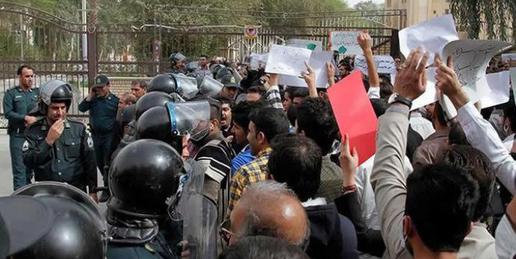Divide and Rule. It’s one of the oldest tricks in the political playbook. The expression is thought to have been coined more than 2,000 years ago by Philip of Macedon, the father of Alexander the Great.
Iranians like to cite the colonial British as the ones who did it best, backing rival rulers and tribes in India and Africa against one another.
They don’t see how their own politicians have not only learned the technique, but applied it with appalling success.
Take the uprising in June 1992 in Mashhad. The religious authorities in charge of the shrine of the 8th Imam Reza decided they wanted to enlarge their compound. When the bulldozers moved in and started to level an adjacent residential area of dilapidated homes and shacks called Mahalle Tollab, it caused a riot.
The authorities, taken aback, knew they had to weaken the protesters’ solidarity by creating factions.
“The people whose houses were seized and destroyed, “ they said, “demand to be distinguished from provocateurs and saboteurs." The authorities duly identified some “provocateurs and saboteurs” and hanged them, which acted as a salutary message to everyone else. In less than two weeks, the protests dwindled away.
It’s not an isolated example. The riots in Shiraz and Arak in 1992 and Iranshahr in 1995 were similarly quelled by blaming the unrest on a criminal few while authorities paid lip service to the legitimate complaints of the “genuine poor.”
Fast forward to the recent wave of protests in more than 80 towns and cities.
At a press conference, President Rouhani was at it again.
“The protesters not only have economic demands,” he said, “but they want changes to foreign policy, regional policy and the way the country is run.” In other words, the legitimate complaints of the poor were being co-opted by those old bogeymen – political saboteurs (and, in another familiar trope, they were being egged on by shadowy foreign agents).
Interestingly, in referring to the political demands, Rouhani signalled he was aware of some of the most incendiary slogans, notably “Death to the Dictator”; “Death to Khamenei”; “Neither Gaza nor Lebanon, I sacrifice myself for Iran” (a criticism of Iran’s support of Hezbollah); and slogans in support of the return of the Pahlavi monarchy.
There are signs the regime is rattled. During the protests we learned that the Iranian Students Polling Agency (ISPA) was ordered to assess ordinary people's satisfaction with the government. The presidential administration also released the three-year-old survey (conducted by the ISPA’s head of strategic studies, Hessameddin Ashna, and published by the Iranian President’s Center for Strategic Studies), showing that about half of Iranians (49 percent) thought that woman’s hijab should be a matter of personal choice.
Since the revolution, some dissent against bad governance and economic hardship has been tolerated. For example, the labor researcher Zahra Ayatollahi reports that there have been over 900 picket lines and strikes in the past 11 months alone – that is since the beginning of the current Persian calendar year in March 2017.
When the dissent grew too strident though, the technique of putting it down remained the same. First a few days of non-reaction by the authorities, then a very public identification of the so-called agitators and provocateurs. Then the security forces moved in to quietly arrest the protests’ leaders one by one, as the politicians paid loud lip service to the pain and frustration of the working poor.
In the early days of the revolution, as the late Ayatollah Khomeini was deftly outmaneuvering his leftist, liberal and Islamist rivals, a wise old man in Tehran gave me a warning in the form of an old story.
Once upon a time, a vineyard was stripped in the night by a group of three thieves. The owner of the vineyard was shocked to learn that two of the thieves were locals – the mullah and the teacher. Only one was a professional bandit. He knew the community would resist casting the blame on the local men, so he came up with a cunning plan.
“Well you are all thieves,” said the vineyard’s owner to the three men. “But the teacher is a respected man who selflessly devotes himself to teaching the children of our village, so I am willing to forget his crime and in future, let him take as many grapes as he likes for his own private enjoyment.”
The other two thieves were furious at the injustice of this, and beat him until he confessed his involvement and cried to be arrested.
By this time a crowd had gathered. The owner then addressed the mullah. “As for you,” he said. “You are supposed to be a religious man upholding our values and yet you participate in the physical beating of our village teacher. And furthermore shared in enjoying stolen goods. You should be ashamed.”
The villagers were convinced, and moved in to handcuff their mullah and lead him away to detention.
Of course later, when they realized that a professional bandit was roaming free in their village and that he’d masterminded the theft of a local vineyard, they arrested him too.
So the principle of divide and conquer is spelled out in our folk tales, and our regime is still using it on us. As long as they’re allowed to get away with it, we are in for many more years of bad governance, arbitrary arrests, brutality and social injustice.
visit the accountability section
In this section of Iran Wire, you can contact the officials and launch your campaign for various problems




















comments
Politics is chess game , we have outsmart the rulers one way or another
I think Islamshahr is correct not Iranshahr, though there too were protests